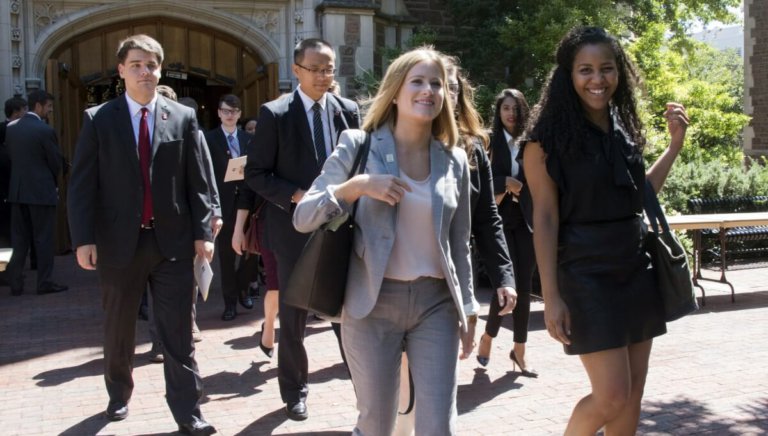
A common misconception states that lawyers are not creative people.
However, the word ‘creativity’ is defined as the ability to create something or come up with something new using original idea – something closely linked to ‘innovative thinking’.
Good lawyers are creative every day, constantly innovating and looking at new ways to approach a particular case, negotiate terms or reframe an undesirable fact about a client.
The future working world will place even more emphasis on innovative employees, and this applies to lawyers, too.
Lawyers are increasingly expected to be agile and flexible to keep up with the changing world and fast-evolving discipline.
This is due to the fact that technology is becoming increasingly embedded in our daily lives, and there’s fear among many that new technologies like Artificial Intelligence (AI) and robotics will replace human employees – like lawyers.
But according to the American Bar Association, “Lawyers and law firms, however, are not on the way to extinction. The tidal wave of change seen in recent years does mean that lawyers need to cultivate agility and embrace innovation and technology to succeed. They need to become flexible lawyers.”
The legal industry is changing every day and in order to keep pace, aspiring lawyers should embrace skill sets that combine legal expertise with breadth of knowledge across multiple disciplines.
But how can lawyers cultivate an innovative, creative mindset? It starts with education. If law students learn early on how to be agile thinkers with the ability to think outside the box and develop new ideas, they will undoubtedly be able to adapt to the Fourth Industrial Revolution and the future working world.
Here are our picks of forward-thinking law schools in the US who are preparing creative legal thinkers through specialist LLMs (Master of Laws) and experiential learning opportunities.
FRANKLIN PIERCE SCHOOL OF LAW, UNIVERSITY OF NEW HAMPSHIRE (UNH)

UNH Franklin Pierce School of Law
With the 5th best intellectual property program in the United States and an overall top 100 ranking nationally, UNH Franklin Pierce School of Law has trained top-tier professionals for decades. Their secret? The school operates like a start-up, pairing engaged faculty working on cutting-edge issues with forward-thinking students.
With LLM, master’s degrees, and graduate certificates, UNH Franklin Pierce School of Law has the largest full-time faculty in intellectual property law and the largest IP library in the Western Hemisphere.
Students gain real-world experience through the on-campus IP Transaction Clinic and International Technology Transfer Institute. Graduates hold influential positions at multinational corporations, including Microsoft, PepsiCo, Samsung, Bayer, and Nintendo. Alums create policy globally, operating in Argentina, China, Korea, India, Switzerland, Singapore, and Taiwan, and at the World Intellectual Property Association.
UNH Franklin Pierce School of Law is located in New Hampshire, ranked America’s 2nd best state to live by US News & World Report. With easy access to New York, Boston, and Washington DC, the campus sits in a charming New England town close to golfing, skiing, fishing, hiking, lakes, oceans, and more.
WASHINGTON UNIVERSITY IN ST LOUIS, SCHOOL OF LAW

WashULaw
Washington University School of Law is a top US law school equipping students with the knowledge and skills to ethically and effectively practice law and pursue justice in a dynamic and globally connected legal environment.
Students learn from diverse faculty members who are industry experts and are committed to excellence in legal education, while also reaping the benefits of extensive out-of-the-classroom activities.
Programmes can be tailored to students’ personal and professional goals, granting them more flexibility. For example, students in the LLM for International Lawyers programmes can design their own curricula to suit individual academic and career goals. Many students choose to pursue a Certificate in a specialty area such as Negotiation & Dispute Resolution, International Law, or Business & Corporate Law.
Students also benefit from studying with an international student body from over 20 countries and diverse legal cultures, preparing to be effective lawyers in today’s globally interconnected environment.
At WashULaw, international students can also enroll in an Intensive Legal English Program the summer before starting their LLM at no additional cost.
BOSTON UNIVERSITY SCHOOL OF LAW

BU Law
This top-tier law school is renowned for its exceptional teaching faculty and high academic standing.
Students can choose from a range of flexible LLM (Master of Laws) and Master’s Degree programmes, whichever one fits in their career goals.
The Graduate Tax Program (GTP) enables students to benefit from a practical curriculum that focuses more on the skills tax professionals need in the workplace than the theory of tax law. Students in this program can earn either an LLM in Taxation, or a Master in the Study of Tax Law, depending on whether they enter the program with a first degree in law.
Graduates of this program achieve remarkable career success; 93 percent of its Class of 2018 graduates are employed in a combination of professional services firms (Big 4 accounting firms) and law firms.
For aspiring corporate lawyers, the LLM in American Law Program is a flexible course where students get to choose from over 200 courses to create an individualised study plan, helping them meet goals such as qualifying to take the NY bar exam, gaining practical lawyering skills, or expanding their knowledge into a new practice area.
The Graduate Program in Banking & Financial Law equips students with the knowledge and skills needed to handle the regulatory, transactional and compliance needs of financial services clients in today’s global economy.
For those in the LLM in Intellectual Property Law Program, they gain the opportunity to learn advanced IP theory and doctrine from some of the top IP scholars in the world.
SCHOOL OF LAW, UNIVERSITY OF CALIFORNIA LOS ANGELES (UCLA)

UCLA School of Law
Law students at UCLA have plenty of opportunity to experience and engage in real-world law practice.
Experiential learning is at the heart of this legal education. Simulation courses focus on litigation, dispute resolution and transactional skill development that expose students to complex business and adjudicatory matters.
Throughout their studies, students here are well-connected to the law trends of today, as experienced faculty members tackle significant social and economic topics in clinics and practicums.
These include global challenges such as climate change, immigration, criminal justice reform, food insecurity and racism.
Designed to complement the upper-level curriculum, the externship programme offers students the chance to put their training into real-world practice.
Students can work with a variety of employers under the programme, such as an extern law clerk to a judge, a non-profit organization to a government agency.
They also benefit from studying and doing their work experience in Los Angeles, California, one of the most diverse and multicultural cities in the world.
UNIVERSITY OF ARIZONA, JAMES E. ROGERS COLLEGE OF LAW

University of Arizona
The University of Arizona Law believes your experience should extend far beyond the lecture hall and has created a curriculum that embodies this ethos. Many of the classes involve simulated or real-world experiences, plus a wide variety of trial advocacy, negotiation, mediation, and interviewing courses to help students apply their expertise. National Jurist magazine ranks Arizona Law fourth among all law schools for practical training.
Their externship program is also considered one of the strongest in the country, including more than 50 judges in state and federal positions. Students have the opportunity to work with organizations such as the Immigrant Survivors Legal Assistance, Florence Immigration and Refugee Rights Project, and the Department of Homeland Security, just to name a few.
Arizona Law also guarantees law clinic placement for every student, highlighting their commitment to gaining real-client experience that prepares students for successful careers. In addition to the faculty-led clinics, students work with alumni and local lawyers to set up student-run clinics that help society’s most vulnerable individuals.
The college also maintains a strong global focus in academics (like its programs in International Economic Law and Policy and Global Mining Law), student body (one of the most globally diverse in the U.S.), and educational partnerships with international institutions.
*Some of the institutions featured in this article are commercial partners of Study International
Liked this? Then you’ll love…
UNH School of Law: Making the grade with top faculty in intellectual property







